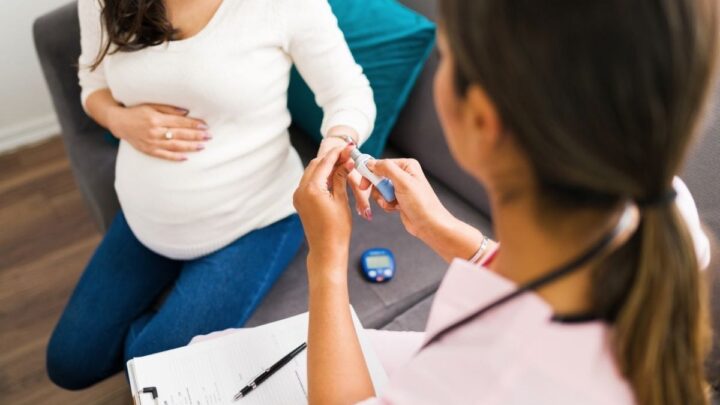What to Eat For Breakfast Before Pregnancy Glucose Test?
The question of what to eat for breakfast before pregnancy glucose test becomes crucial when considering that 15% to 66% of women receive false-positive results. This screening test, typically conducted between weeks 24 and 28 of pregnancy, helps identify the 2-10% of expecting mothers who may develop gestational diabetes.

However, what many pregnant women eat before their glucose screening can significantly impact their test results. Specifically, foods high in refined carbohydrates and sugars can lead to blood sugar spikes, potentially affecting the accuracy of the test, which measures if blood glucose levels stay below 140 mg/dL.
This guide provides doctor-approved breakfast options and preparation strategies to help expecting mothers approach their glucose screening test with confidence and clarity.
About Your Pregnancy Glucose Test
The pregnancy glucose test consists of two distinct phases designed to screen and diagnose gestational diabetes effectively. During the initial screening, known as the glucose challenge test, pregnant women drink a solution containing 50 grams of glucose.
What happens during the test
The first phase requires no fasting or special preparation. Subsequently, a blood sample is taken exactly one hour after consuming the glucose drink. Blood sugar readings above 140 mg/dL indicate the need for the second phase – a longer glucose tolerance test.
The glucose tolerance test involves more detailed monitoring. Primarily, this three-hour test begins with a fasting blood draw, followed by consuming a 100-gram glucose solution. Blood samples are then collected at precise one-hour intervals over the next three hours.
Why timing matters
The body’s response to glucose notably varies throughout the day. Research demonstrates that afternoon glucose tests often show lower readings compared to morning appointments. Furthermore, the fasting duration before the test influences results significantly.
Medical professionals typically schedule these screenings between weeks 24 and 28 of pregnancy. Additionally, women with higher risk factors might need earlier testing. These factors include:
- Previous gestational diabetes history
- Family history of diabetes
- Body mass index indicating obesity
- High blood pressure
- Age over 35 years
What to eat for breakfast before pregnancy glucose test becomes particularly crucial since the body processes glucose differently at various times of day. The circadian rhythm affects insulin sensitivity, which peaks during daylight hours and decreases during nighttime. This biological pattern explains why healthcare providers often recommend morning appointments for more accurate results.

Best Time to Schedule Your Test
Scheduling considerations play a vital role in what to eat for breakfast before pregnancy glucose test results. Research shows that the time of day significantly affects glucose measurements in pregnant women.
Morning vs afternoon appointments
Primarily, morning appointments yield more accurate results for glucose tolerance tests. Studies indicate that afternoon tests often show lower glucose readings. This variation occurs because the body processes sugar differently throughout the day.
Medical professionals recommend scheduling the glucose test early in the morning. This timing offers two key advantages:
- Allows for easier fasting compliance
- Provides more consistent test results
- Minimizes disruption to daily routines
Ideal eating window
The fasting duration before the test directly influences glucose measurements. For the initial screening test, no special preparation is needed. Consequently, pregnant women can eat their regular meals, though avoiding excessive sugar intake remains crucial.
For the three-hour glucose tolerance test, stricter guidelines apply. Healthcare providers require:
- A fasting period of 8 to 14 hours
- Only sips of water allowed during fasting
- Normal eating patterns in the days leading up to the test
What to eat for breakfast before pregnancy glucose test depends on which version you’re taking. For morning screenings, eating a balanced breakfast is acceptable. Moreover, afternoon appointments require careful timing of meals to ensure accurate results.
The test typically takes place between weeks 24 and 28 of pregnancy. Therefore, planning ahead becomes essential. Some healthcare providers might schedule testing earlier for high-risk patients. Overall, maintaining consistent eating patterns in the days before testing helps ensure reliable results.
Research demonstrates that both time of day and fasting duration influence glucose measurements. Accordingly, standardizing these factors has become an important goal in gestational diabetes screening. Understanding these timing requirements helps pregnant women prepare appropriately for what to eat for breakfast before pregnancy glucose test day.
Doctor-Approved Breakfast Options
Selecting appropriate foods for breakfast before pregnancy glucose test requires careful consideration of nutrient composition. Medical professionals recommend specific breakfast combinations that help maintain stable blood sugar levels.
Protein-rich choices
Primarily, healthcare providers suggest consuming at least 20 grams of protein at breakfast. Protein-rich foods help regulate blood glucose levels and provide sustained energy. Some doctor-approved protein options include:
- Eggs prepared various ways (scrambled, omelet, hard-boiled)
- Greek yogurt with minimal additives
- Cottage cheese
- Lean meats like chicken or turkey
- Tofu scramble with vegetables
Complex carbohydrates to include
Complex carbohydrates paired with protein create balanced what to eat for breakfast before pregnancy glucose test options. Essentially, these foods provide steady energy release without causing dramatic blood sugar spikes. Doctor-approved complex carbohydrates include:
Whole grain toast with avocado or natural peanut butter offers a balanced combination. Meanwhile, steel-cut oats prepared with eggs and hemp seeds provide both protein and fiber. Alternatively, quinoa or brown rice can serve as excellent breakfast bases when combined with protein sources.
Non-starchy vegetables like broccoli, spinach, and tomatoes complement protein choices perfectly. These vegetables add essential nutrients while maintaining stable blood sugar levels. What to eat for breakfast before pregnancy glucose test should always include fiber-rich options that help manage glucose response.
Foods to completely avoid
What not to consume becomes equally crucial for accurate test results. Medical professionals strongly advise against several common breakfast items that can affect glucose readings:
- Fruit juices and smoothies (even all-fruit varieties)
- Refined cereals and white bread products
- Pancakes, waffles, and French toast
- Pastries, muffins, and donuts
- Sweetened toppings like jam or syrup
What to eat for breakfast before pregnancy glucose test should exclude caffeine in excess, as it can lead to dehydration and affect blood volume. Furthermore, processed foods containing hidden sugars require careful attention, as they can unexpectedly influence test results.
Choosing the right breakfast combination helps ensure accurate glucose test results. What to eat for breakfast before pregnancy glucose test should focus on protein-rich foods combined with complex carbohydrates while strictly avoiding refined sugars and simple carbohydrates.

Smart Preparation Timeline
Proper preparation plays a crucial role in what to eat for breakfast before pregnancy glucose test accuracy. Following a structured timeline helps ensure reliable results while maintaining comfort throughout the testing process.
Night before preparations
Prior to the glucose screening, pregnant women should maintain their regular eating patterns. Following standard dietary habits in the evening helps prevent any unexpected variations in blood sugar levels. What to eat for breakfast before pregnancy glucose test preparation actually begins with the last meal of the previous day.
For those scheduled for the one-hour screening test, eating a balanced dinner consisting of complex carbohydrates and protein supports stable blood sugar levels. Alternatively, women preparing for the three-hour glucose tolerance test must begin fasting 8 to 14 hours before the appointment.
Primarily, healthcare providers recommend avoiding any major dietary changes in the days leading up to the test. Making sudden modifications to eating habits might affect the reliability of results. What to eat for breakfast before pregnancy glucose test planning should focus on maintaining consistency rather than implementing dramatic changes.
Morning of the test
The morning routine varies based on the specific type of glucose test scheduled. For the initial one-hour screening, what to eat for breakfast before pregnancy glucose test depends on appointment timing. Medical professionals recommend these morning preparations:
- Avoid high-sugar foods like pancakes, donuts, or juice
- Choose protein-rich options if eating is permitted
- Drink only water after consuming the glucose solution
- Arrive 15 minutes before scheduled blood draw time
- Keep the glucose drink refrigerated but avoid freezing
For the three-hour glucose tolerance test, stricter guidelines apply. Following an overnight fast, patients must continue avoiding food and beverages except for small sips of water. What to eat for breakfast before pregnancy glucose test becomes irrelevant in this case, as fasting remains mandatory until test completion.
The testing process involves drinking a glucose solution containing either 50 grams for the screening test or 75-100 grams for the diagnostic test. After consumption, patients must remain at the testing facility for the required duration – one hour for screening or three hours for the diagnostic test.
Common Breakfast Mistakes to Avoid
What to eat for breakfast before pregnancy glucose test requires awareness of common pitfalls that can affect results. The average American consumes 22 teaspoons of added sugar daily, making breakfast choices particularly crucial for accurate glucose screening.
Hidden sugar sources
Selecting what to eat for breakfast before pregnancy glucose test becomes challenging due to unexpected sugar sources in seemingly healthy foods. Many breakfast favorites contain hidden sugars that can spike blood glucose levels. Some yogurt cups pack up to 6 teaspoons of sugar, primarily from added sweeteners rather than natural dairy sugars.
Indeed, manufacturers often mask sugar content through various naming conventions. Common breakfast items with concealed sugars include:
- Instant oatmeal and breakfast cereals
- Flavored coffee creamers and milk alternatives
- Protein bars and granola
- Nut butters with added sweeteners
- “Healthy” whole-grain breakfast bars
- Fruit preserves and jams
Generally, ingredients ending in “-ose” indicate hidden sugars. Similarly, terms like syrup, molasses, and juice concentrate signal added sweeteners that can affect what to eat for breakfast before pregnancy glucose test results.
Portion size errors
Portion control plays a vital role in managing blood glucose levels. Research shows that glucose excursions peak between 45 and 90 minutes after meals, making portion size crucial for what to eat for breakfast before pregnancy glucose test accuracy.
Food manufacturers often reduce serving sizes to make products appear lower in sugar content. Nevertheless, consuming larger portions than recommended can lead to:
- Increased blood sugar spikes
- Inaccurate test results
- Misrepresentation of actual sugar intake
The American Heart Association recommends limiting daily added sugar intake to 25 grams for women and 36 grams for men. Alternatively, some breakfast items can contain nearly half this amount in a single serving when portion sizes aren’t carefully monitored.
Quality and quantity of carbohydrates significantly influence glycemic response. The glycemic index of foods varies based on:
- Protein and fat content
- Fiber type and amount
- Food particle size
- Processing methods
What to eat for breakfast before pregnancy glucose test planning should account for these factors. Research indicates that skipping breakfast increases the risk of elevated blood sugar levels, making proper portion control of a balanced meal essential for accurate test results.
What to Eat For Breakfast Before Pregnancy Glucose Test Frequently Asked Questions
Can I eat breakfast before my pregnancy glucose test?
It depends on the type of test you’re taking. For the initial one-hour screening, you can eat a balanced breakfast that’s low in sugar and contains complex carbohydrates and protein. However, for the three-hour glucose tolerance test, you’ll need to fast for 8-14 hours beforehand.
What are some doctor-approved breakfast options before the glucose test?
Good choices include protein-rich foods paired with complex carbohydrates. Examples are whole grain toast with avocado or natural peanut butter, Greek yogurt with minimal additives, or a tofu scramble with vegetables. Avoid foods high in sugar or refined carbohydrates.
How should I prepare the night before my glucose test?
Maintain your regular eating patterns and have a balanced dinner with complex carbohydrates and protein. Avoid making any major dietary changes in the days leading up to the test. If you’re scheduled for the three-hour test, begin fasting 8-14 hours before your appointment.
What time of day is best for scheduling the glucose test?
Morning appointments are generally recommended for more accurate results. The body processes glucose differently throughout the day, and morning tests tend to provide more consistent readings. Additionally, morning appointments make it easier to comply with fasting requirements.
What are some common breakfast mistakes to avoid before the glucose test?
Be cautious of hidden sugar sources in seemingly healthy foods like flavored yogurts, instant oatmeal, and protein bars. Also, pay attention to portion sizes, as consuming larger portions than recommended can lead to blood sugar spikes and potentially affect test results.


